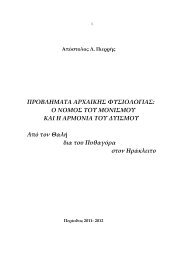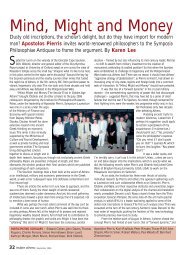APPENDIX C΄ ON DEPILATION: BODY COSMETICS IN CLASSICAL ...
APPENDIX C΄ ON DEPILATION: BODY COSMETICS IN CLASSICAL ...
APPENDIX C΄ ON DEPILATION: BODY COSMETICS IN CLASSICAL ...
You also want an ePaper? Increase the reach of your titles
YUMPU automatically turns print PDFs into web optimized ePapers that Google loves.
590 <strong>APPENDIX</strong> <strong>C΄</strong><br />
ΛÚÔÓÙ˜ Ùa appleÚfi‚·Ù·, to which Suda as well agrees: Ó·ÎÔÙ›ÏÙ·ÈØ Ôî<br />
ÙáÓ appleÚÔ‚¿ÙˆÓ ÎÔ˘ÚÂÖ˜. Eustathius (p. 1771.47 sqq.) gives both<br />
meanings. In conclusion we see that both uses were authorized by the<br />
poets and prosewriters, but that the grammarians and philologists<br />
were, as usual, in dispute as to which is the correct use. Pausanias IV,<br />
11, 3 expresses I think the true state of affairs: ıÒڷη ÁaÚ j àÛapple›‰·<br />
Âr¯ÂÓ ≤ηÛÙÔ˜, ¬ÛÔÈ ‰b äapplefiÚÔ˘Ó ÙÔ‡ÙˆÓ, appleÂÚÈ‚¤‚ÏËÓÙÔ ·åÁáÓ<br />
ӿη˜ ηd appleÚÔ‚¿ÙˆÓ, Ôî ‰b ηd ıËÚ›ˆÓ ‰¤ÚÌ·Ù· etc. The ‰¤ÚÌ· of<br />
sheep and goat was called Ó¿ÎË or Ó¿ÎÔ˜. To return to Hesychius’<br />
explanation of ηوӿÎË, we note that the scholia to Ecclesiazousai,<br />
724 and Suda s.v., are in agreement: îÌ¿ÙÈfiÓ âÛÙÈÓ âÎ ÙáÓ Î¿Ùˆ<br />
ÌÂÚáÓ Ó¿ÎÔ˜, ÙÔ˘Ù¤ÛÙÈ ‰ÈÊı¤Ú·Ó, appleÂÚÈÂÚÚ·Ì̤ÓÔÓ. This dress was<br />
considered appropriate for slaves, near-slaves, or the slavish in origin or<br />
behaviour. Thus the sch. to Eccles. 724 have: âÓÙ·Üı· ‰b ‰Ô˘ÏÈÎe˜ ηd<br />
àÓÂχıÂÚÔ˜ ¯ÈÙÒÓ; and Aristophanes in Lysistrata 1150-1 describes<br />
the Athenians under the Peisistratidean tyranny to have worn ηو-<br />
ӿη˜, i.e. be as slaves and wearing the characteristic dress of slaves<br />
(the former would be enough for the requirements of the<br />
Aristophanean passage just mentioned; but Hesychius and Suda s.v.<br />
ηوӿÎË and the scholiast to Lysistrata 618 expressly mention that<br />
the tyrants did enforce the wearing of that dress by the Athenians); cf.<br />
also Athenaeus VI, 217d.<br />
Now Brunck’s construal of the Aristophanian passage in Ecclesiaz.<br />
(i.e. having plucked out the pubic hair for the sake of a slave, for him<br />
to enjoy it) is unnatural and improbable; it would further necessitate<br />
taking the characteristic cloth of a group of men for that group.<br />
K·ÙˆÓ¿ÎËÓ on the other hand is accepted by all major critics; and it<br />
is connected generally to the various kinds of tonsure. (For ÎÔ˘Ú·d<br />
ÎÂÊ·Ïɘ v. Acharnenses 849 and Aves 806 with the scholia; also<br />
Thesmophoriazousai 838 with sch.; especially Pollux II 29-31; IX, 13;<br />
Herodotus IV, 175; Thucydides II, 62; Hesychius s.vv. ÎÉappleÔ˜, ÌÈ÷Ä<br />
Ì·¯·›Ú÷·, and ÛοÊÈÔÓ; Harpocration and Photius s.v. ÛοÊÈÔÓ;<br />
Lucianus Lexiphanes, 5; Nicostratus apud Athenaeus, II, 47e;<br />
Eustathius 907.40 sqq.). Cf. Eupolis Fr. 313 PCGr. vol. V p. 479:<br />
qÏı˜ / â͢ÚË̤ÓÔ˜ Û·‚‡ÙÙÔ˘˜, where the Glossae of pap. Ox. 1803<br />
explain: Û¿‚˘ÙÙÔ˜Ø ÎÔ˘ÚĘ Âr‰fi˜ ÙÈ, whereas Hesychius hesitates<br />
whether it was a kind of hair dressing or shaving; s.v. Û¿‚˘ÙÙÔ˜Ø Âr‰Ô˜<br />
͢ڋÛ(ˆ˜) Âå˜ Î·ÏψappleÈÛÌfiÓ. applefiÙÂÚÔÓ ‰b ÙÔÜ appleÒÁˆÓÔ˜ j Ùɘ










